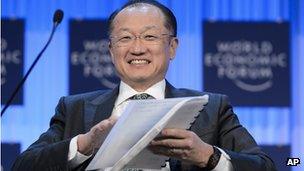Davos 2013: World Bank head says don't shun poor coal-using nations
- Published

Mr Kim said the World Bank had to keep a "steady drumbeat" about climate change
The World Bank should support poor countries that need coal-powered energy in spite of its contribution to climate change, its president has said.
Jim Yong Kim, speaking at Davos, said the institution should not "turn its back" on poor nations that seek the cheap source of energy.
His first priority was for countries to have the energy needed to boost their economies, he said.
Mr Kim has often warned of the dangers of climate change on future growth.
"My first priority is for countries to have the energy they need to lift their own people out of poverty. It's a tough negotiation," he said.
"We want to do everything we can to lower the use of coal. But we can't turn our backs when poor countries need coal," to lift their economies and provide heat for their populations.
Mr Kim, an avid advocate against global warming, said the bank's and the world's top priorities needed to be energy pricing, ending fuel subsidies and making low-carbon cities.
"I feel like I have to tackle this issue as a matter of conscience. [Climate change] is real," he said.
"We have to keep up a steady drumbeat in between the extreme weather events. I think our role at the bank is to continue to inform the [public of the] impact [of climate change].
"The extreme weather events are going to have a powerful impact on people's understanding of climate change."
A recent World Bank report concluded that world temperatures could warm by 4C by the end of this century if no concerted action is taken.
In a recent opinion piece in the Washington Post, external, Mr Kim wrote: "A world that warm means seas would rise 1.5 to 3 feet, putting at risk hundreds of millions of city dwellers globally.
"It would mean that storms once dubbed 'once in a century' would become common, perhaps occurring every year. And it would mean that much of the United States, from Los Angeles to Kansas to the nation's capital, would feel like an unbearable oven in the summer."